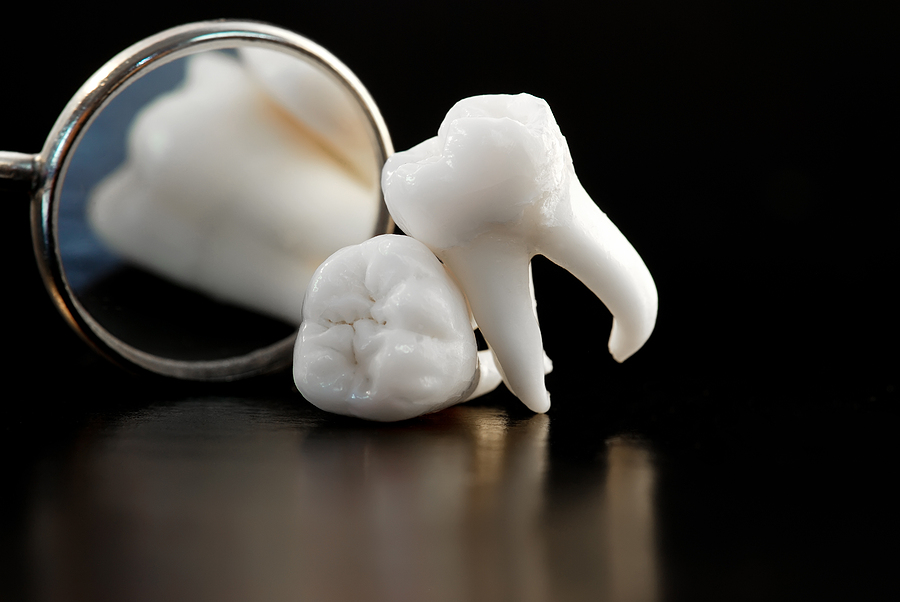WHAT’S THE DEAL WITH WISDOM TEETH?

WHAT’S THE DEAL WITH WISDOM TEETH?
With a moniker like “wisdom teeth,” you would expect to hear a lot of positive attributes about our third set of molars. Unfortunately, wisdom teeth are known to cause a host of dental issues including overcrowding, nerve damage, infection, bone damage, and more. Wisdom teeth extraction is a surgical procedure and if your dentist has told you that your teeth need to be pulled, you could be wondering exactly why we even have these dreaded wisdom teeth.
WHY DO WE HAVE WISDOM TEETH?
Wisdom teeth are a human’s upper and lower third set of molars and typically erupt after the age of 17. However, wisdom teeth begin to form in the back of the mouth around the age of 10. Individuals may get anywhere from one to four wisdom teeth with some very lucky people getting none at all. Furthermore, there have been cases of patients having more than four wisdom teeth develop. Anthropologists believe that wisdom teeth are “evolutionary relics” left behind by our ancestors. The wisdom teeth erupted to assist early humans with the chewing of rough and uncooked foods such as nuts, root plants, and meats. As humans began to cook food to soften it, our jaws became smaller. With smaller jaws, there is less room in the back of our mouths for the third set of molars. Scientists have classified wisdom teeth as vestigial organs—meaning they no longer have a function inside the human body. Genetic researchers believe humans may eventually never have wisdom teeth at all.
REASONS FOR WISDOM TEETH EXTRACTION
With jaws only made to hold 28 teeth, problems can arise when we have 32 permanent teeth erupt. Although some individuals will be able to accommodate the extra teeth in their mouths, the majority will need the teeth removed. According to the American Association of Oral and Maxillofacial Surgeons, approximately 85 percent of all wisdom teeth require extraction. The most common reason for extraction is impacted wisdom teeth. Wisdom teeth are often impacted because the teeth surrounding them prevent the molars from erupting. Impacted wisdom teeth are prone to cyst formation. These cysts could cause damage to both the surrounding nerve and bone tissue. Wisdom teeth that partially erupt can cause issues too and make your gums prone to infection since bacteria can get stuck in the area around the tooth. Symptoms of an infection include:
- Pain at site
- Redness
- Swelling
- Jaw pain
- Jaw Stiffness
WISDOM TEETH REMOVAL SURGERY
The American Association of Oral and Maxillofacial Surgeons recommends removing wisdom teeth in your twenties if possible. After the age of 35, patients are at risk for complications and may have a longer recovery period. Wisdom teeth extraction is performed at a dental or oral surgeon office. A wisdom tooth that has already erupted through the gums can be pulled out in the same manner as any other tooth. Impacted wisdom teeth require a more advanced surgical procedure. An incision is made through the gums and any bone blocking the tooth will need to be removed. The tooth can then be extracted from the mouth. During the procedure, you will be given anesthesia to numb the area and diminish any discomfort you may feel. Stitches may also be used following the surgery to promote healing. Some localized bleeding and pain are common in the recovery period after a wisdom tooth removal surgery. Pain relief medications and a soft food diet are typically recommended after impacted wisdom teeth are removed. Dobson Ranch Dental Care is here to help with all of your oral care needs. Book an appointment today with one of our friendly and professional team members in our Mesa, Arizona office.
Office Hours
MON7:00 am - 4:00 pm
TUE7:00 am - 4:00 pm
WED7:00 am - 4:00 pm
THU7:00 am - 3:00 pm
FRIClosed
SATClosed
SUNClosed





















comments